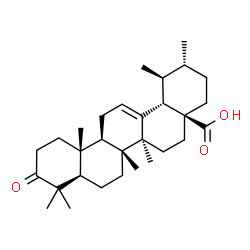| Description |
Ursolic acid, a naturally occurring triterpenoid, induces the apoptosis of human cancer cells through multiple signaling pathways. In vitro: Ursolic acid is important in the induction of apoptosis via AKT/NF-κB signaling suppression in T24 human bladder cancer cells and this occurs in a dose-dependent manner. Thus, Akt and NF-κB are potential targets for bladder cancer therapy and ursolic acid may serve as a naturally-occurring candidate drug for the prevention and treatment of bladder cancer.[1]Ursolic acid induce apoptosis via inhibition of NF-κB induced BCl-2 mediated anti-apoptotic pathway leading to activation of p53 induced and caspase-3 mediated pro-apoptotic pathways.[2]In vivo: UA significantly suppressed prostate tumor growth in nude mice without any significant decrease in body weight. The systemic bioavailability of UA in serum samples obtained from nude mice. UA was detected in all serum samples 24 h after last injection. Systemic bioavailability of UA was in nanogram range and metabolites of UA were not detected in the samples. These results indicate that UA is well absorbed in the mouse peritoneum and supports the role of UA as a potent compound for chemoprevention and therapy of prostate cancer. [3]
|
| Related Catalog |
|
| References |
[1]. Gai, L., Cai, N., Wang, L., Xu, X. & Kong, X. Ursolic acid induces apoptosis via Akt/NF-kappaB signaling suppression in T24 human bladder cancer cells. Molecular medicine reports 7, 1673-1677, doi:10.3892/mmr.2013.1364 (2013). [2]. Manu, K. A. & Kuttan, G. Ursolic acid induces apoptosis by activating p53 and caspase-3 gene expressions and suppressing NF-kappaB mediated activation of bcl-2 in B16F-10 melanoma cells. International immunopharmacology 8, 974-981, doi:10.1016/j.intimp.2008.02.013 (2008). [3]. Shanmugam, M. K. et al. Ursolic acid inhibits multiple cell survival pathways leading to suppression of growth of prostate cancer xenograft in nude mice. Journal of molecular medicine 89, 713-727, doi:10.1007/s00109-011-0746-2 (2011).
|


